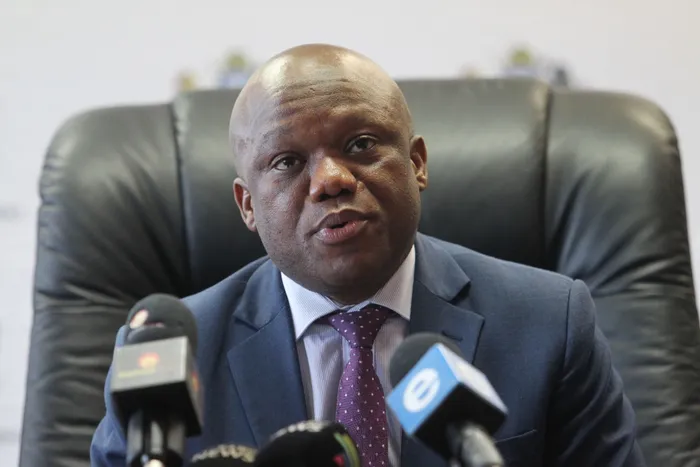Black-Owned Firm left in limbo as Public Works 'hides' PwC Report
Maziya demands full PwC forensic report as Parliament accuses Public Works of secrecy over R836 million hospital oxygen tender

Deputy Minister of Public Works and Infrastructure Sihle Zikalala.
Image: Picture: Doctor Ngcobo / Independent Newspapers / File
The battle over transparency in South Africa’s R836 million hospital oxygen plant tender has escalated into a political and legal standoff, as Parliament demands answers on who leaked a confidential PricewaterhouseCoopers (PwC) forensic report and why the Department of Public Works and Infrastructure (DPWI) continues to withhold it.
At the centre of the storm is Maziya On Site Gas Systems Joint Venture, one of two contractors appointed to deliver oxygen production facilities to 55 public hospitals across the country. Maziya insists it has “nothing to hide” and has written to Minister Dean Macpherson, demanding access to the full report.
Lowest Bidder, Highest Suspicion
Maziya General Services’ R152 million bid was the lowest among qualifying bidders when the tender was awarded by the Independent Development Trust (IDT). A second contract worth R428 million went to Bulkeng.
The PwC forensic probe was commissioned after allegations of procurement irregularities within the IDT surfaced. To date, there have been no adverse findings against Maziya, yet the company remains under scrutiny, a situation MPs now say appears unjustified.
“It’s ironic that the company which quoted the lowest, a black owned firm with a proven record, is the one left in limbo,” said ANC MP Sipho Mahlangu during last week’s committee session. “Meanwhile, firms that quoted much higher were treated as if they were more credible.”
ActionSA’s Malebo Kobe added that the department must explain its actions.
“If there are no allegations against Maziya, and their price was competitive, then the department must explain why this contract was singled out for scrutiny,” she said.
A Secret Report and Angry MPs
Portions of the PwC report have already been leaked to the media, including annexures that allegedly detail procurement manipulation within the IDT. The department has condemned the leaks as “unauthorized,” but members of Parliament insist that the public has a right to see the full report.
Committee chair Carol Phiri accused the department of showing “utter disdain” for Parliament by submitting only a summary version.
“The minister has discussed the report in the media, yet Parliament is handed a sanitized version,” Phiri said. “This is not transparency, it’s damage control.”
Deputy Minister Sihle Zikalala defended the department’s position, arguing that full disclosure could jeopardize disciplinary and criminal proceedings. But governance expert Dr. Nomusa Mthethwa disagreed.
“A summary report is not sufficient for parliamentary oversight,” she said. “The department’s job is to be accountable to Parliament, not to protect itself from embarrassment.”
DBSA’s Silence Under Scrutiny
The Development Bank of Southern Africa (DBSA) has also come under pressure for refusing to take over Maziya’s portion of the project after the IDT stalled.
According to Department of Health spokesperson Foster Mohale, the DBSA advised against intervention because there were “no allegations of wrongdoing” against Maziya and “any disruption could have delayed delivery of the oxygen plants.”
However, procurement analysts have questioned whether the DBSA had access to the PwC findings before making that determination.
“If DBSA had access to the report, it should say so,” said a senior government supply chain analyst. “If it didn’t, then its decision was based on incomplete information. Either way, the public deserves an explanation.”
Maziya’s Legal Letter to Minister Macpherson
In a formal letter dated 3 November 2025, Exton Attorneys, acting on behalf of Maziya, wrote to Public Works Minister Dean Macpherson demanding a copy of the PwC report. The letter, seen by The Star, outlines the company’s frustration over what it calls “an unending cloud of speculation and distortion.”
In the letter, attorney Wilf Exton states that Maziya had fully cooperated with PwC investigators and now requires the report to defend itself against what it describes as “distortive and misrepresentative” media coverage.
“Our client has been the focal point of an intense and speculative media driven narrative,” the letter reads. “An unadulterated and full copy of the report is urgently required by our client in finally having the actual findings to hand with which to definitively dispel the present and ever growing cloud of uncertainty, speculation and distortion being visited on our client.”
Exton refers to a recent Daily Maverick article depicting Maziya as “complicit, collusive and unscrupulous,” saying the company intends to lodge a formal complaint with the Press Ombud.
The letter further argues that the stalled handover of the project, still awaiting cession from the IDT, has left Maziya unable to begin work on hospitals that urgently need oxygen infrastructure.
“A copy of the report is likewise required by our client in assisting it to progress with its presently stalled building contract, which has been in a state of unnecessary and unjustified limbo,” the letter continues. “Our client hereby humbly requests a copy of the report as a matter of utmost urgency, whilst undertaking to bind itself to whichever conditions you may reasonably require.”
Exton concludes the letter by reminding the Minister that Maziya has acted transparently throughout and deserves access to the same information being discussed publicly.
Parliament Turns Up the Pressure
MPs have now escalated the matter to the Speaker of Parliament, demanding that the department provide the full PwC report. Several committee members have also proposed that DBSA officials be summoned to explain their involvement in the tender’s stalled handover.
“This isn’t just about one contract, it’s about trust in the state’s procurement system,” said Phiri. “The department can’t hide behind process excuses when billions of rands are at stake.”
As the political fallout widens, the leak of portions of the PwC report has shifted public attention from the contractors to the Department of Public Works, the Independent Development Trust, and the DBSA.
One MP summed up the sentiment bluntly:
“The only secret here is why the government is hiding information that could clear an innocent contractor.”